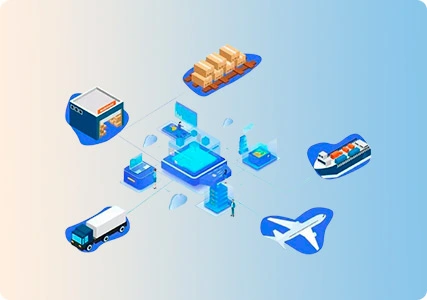Cross-border e-commerce logistics transport can be divided into the following six links according to the postal parcel shipping process from a system, each link contains several common elements, and the contents of these links are organized and categorized as follows.
(1) sending country/region logistics channels: real weight, volume weight, tracking number, transfer number, row warehouse. Explosive warehouse, remote, online time limit, take-off time limit, not online, declaration;
(2) Customs of the country/region of shipment: export package seal opening, export package direct seal distribution, export package seal distribution;
(3) Airfreight, in transit: delivery, transshipment/transit:
(4) Receiving country/region customs: customs clearance, tax number, quarantine, tariff, customs deduction, customs clearance time limit;
(5) Receiving country/region logistics: discard/return, collection, lost goods;
(6) Receiver sign-off, proper delivery.
Postal parcel shipping process terminology
Actual weight
The actual weight is the total actual weight of a shipment, including packaging.
Volumetric/dimension weight
In EMS and commercial courier charges, in addition to the actual weight of the parcel, the volumetric weight of the parcel will be calculated and the greater of the volumetric weight or the actual weight will be used as the charge. When the volume weight > the actual weight, then according to the volume weight of the freight charges; on the contrary, according to the actual weight of the freight charges.
EMS only needs to calculate the volumetric weight if the length, width, and height of any one of the three sides reach 60cm and above.
Tracking number
When the parcel is collected by the logistics channel service provider, the logistics channel service provider will provide a set of letters plus numbers or pure numbers combination of logistics information tracking numbers, the buyer can trace the latest status of the parcel through this set of the tracking numbers. The following China Post registered parcel as an example single number explanation: RR123456789CN.
Transfer number
Transfer number is the air parcel can't reach the receiving country/region directly from the sending country/region, passing through the third party country/region on the way, thus generating another set of tracking numbers, or after arriving at the receiving country/region, the local delivery company may give another tracking number; it may also be the transfer number that encounters an abnormal situation.
Row positions
Row positions refer to the goods that the customs have released to the airline according to the size of the goods, light and heavy load table, and then handed over to the cargo terminal for cargo boxing or pre-matching, generally refers to the four major express flights warehouse space is insufficient and need to wait for the situation, may charge row position fees.
Blasting warehouse
Generally refers to the logistics peak season express or postal channels too many parcels and beyond the capacity, too late to sort, and even no way to receive the pieces, a large number of express mail stranded in the place sent by A to the day of the relatively long time. The reasons for this are weather factors (such as heavy snow, floods, typhoons, etc.), online shopping peaks (mostly after holidays, such as Christmas, New Year's Day, Chinese New Year, Valentine's Day, etc.), international events to strengthen security checks (such as the Olympic Games, etc.), long holidays, most of the personnel of courier companies on holiday, etc.
Remote area
For parcels shipped by commercial couriers, some areas are not well developed, so the courier company will charge some extra service fees. The postal channel (including EMS) delivery, do not charge the remote area fee.
Information received
The online time limit refers to the speed at which the post office receives the goods and uploads the order number data to the official website after delivery. If it is distributed by direct seal, you can usually see the logistics information updated within 1~3 working day after you get the single number. For parcels shipped online, the warehouse can basically see the logistics information updated the next day after the parcel is received on a working day.
If the parcel is shipped offline, and it more than 3 to 5 days still can not see the logistics information update, then sellers need to seriously consider the timeliness of this freight forwarder processing goods, it is likely that the freight forwarder will transfer the goods to other freight forwarders caused by the logistics information update lag. Platform promotion or shopping season, because the processing capacity of each post office is limited, burst warehouse when the goods pile up like a mountain, it is likely to lead to a serious lag in the update of logistics information.
Dispatched to overseas
The time of departure usually refers to the time when the post office sends the goods to customs for inspection, and then the goods are released by the customs and wait for the flight at the airport. Generally speaking, flights to Europe and the United States are more frequent and faster, while those from undeveloped countries/regions must wait longer.
Information failed
The data on the official website has not been updated and no information about the parcel is available for the time being.
Claim
Declaration refers to the sender's statement of the contents of the parcel, reflecting the three main elements of the item details, quantity, and amount on the formal invoice (express) or customs declaration (small parcel) so that the customs of the receiving country/region can check the goods. For example, actions such as the addition of customs duties are generated based on the declared information surface.
Arrival at the transit office of the exchange
In general, when sending export parcels, the parcels will be sealed in the postal bag according to the different destination countries/regions, which is called the total package. After the customs inspection, the parcel is sealed again, called the protective seal. The post office hands over the goods to customs (they are all packed in one big bag, and each big bag is filled with a lot of China Post parcels), and customs will unpack the post office parcels in big bags and scan them through the machine, sometimes with random checks to see if the items are consistent with the application. So the name of the goods should be written clearly, if there is ambiguity in the information, customs will do the unpacking and check, which will delay the time of sending the goods.









